Memory Performance: 16GB DDR3-1333 to DDR3-2400 on Ivy Bridge IGP with G.Skill
by Ian Cutress on October 18, 2012 12:00 PM EST- Posted in
- Memory
- G.Skill
- Ivy Bridge
- DDR3
Conversion – Xilisoft 7
Another classic example of memory bandwidth and speed is during video conversion. Data is passed between the memory and the CPU for processing – ideally faster memory here helps as well as memory that can deal with consecutive reads. Multiple threads on the CPU will also provide an additional stress, as each will ask for different data from the system. Our test uses two sets of conversions: first, a series of 160 videos have the first three minutes of each converted from various formats (480p to 1080p mkv) to AAC audio; and second is the motherboard testing, converting 32 1080p videos to iPod format. Each test is measured by the time taken to complete.
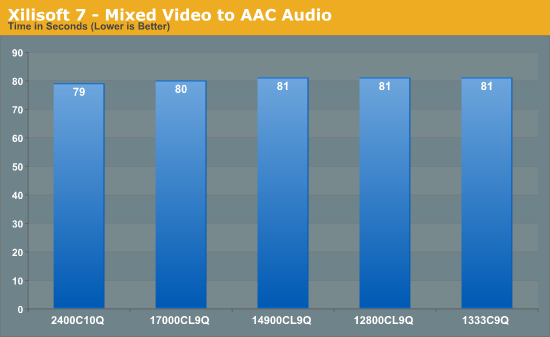
Converting to AAC seems to depend not on the memory – the movement of data from storage to memory to CPU is faster than the CPU can compute.
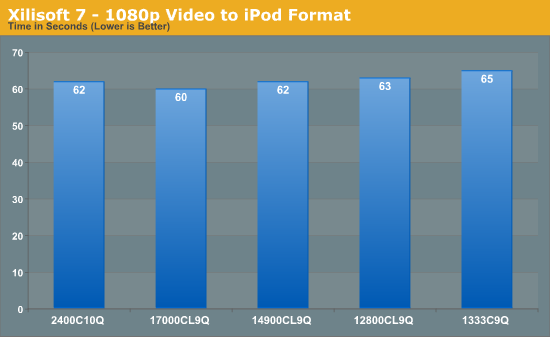
Video conversion is often one area quoted as being beneficial for memory speed, however these does not seem strictly true. As data is moved from storage to memory to the CPU, only if that memory transfer is the limiting factor does having faster memory help. In conversion to an iPod video format, that seems true moving from DDR3-1333 to DDR3-2133 just about, however it seems the limiting factor is still the CPU speed or the algorithm doing the conversion.
Folding on GPU
Memory usage is all algorithm dependent – if the calculation has a lot of small loops that do not require additional reads memory, then memory is unimportant. If the calculation requires data from other sources in those calculations, then memory can either be stressed randomly or sequentially. Using Ryan’s Folding benchmark as a platform, we are testing how much memory affects the serial calculation part of a standard F@H work unit.
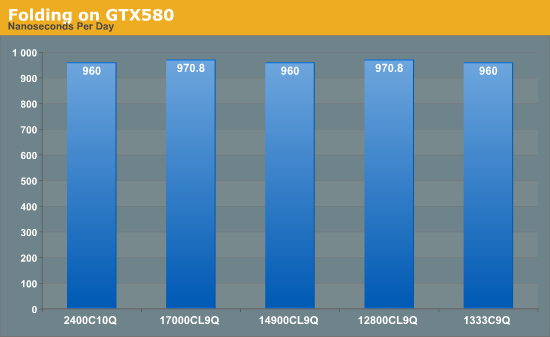
Unfortunately this test is only available to the nearest second, thus the benchmark finishes in either 89 or 90 seconds, giving appropriate ns/day. From the results, folding on GPUs is not affected by memory speed.
WinRAR x64 4.20
When compressing or converting files from one format to another, the file itself is often held in memory then passed through the CPU to be processed, then written back. If the file is larger than the available memory, then there is also loading time between the storage and the memory to consider. WinRAR is a variable multi-threaded benchmark, whereby the files it converts and compresses determines how much multi-threading takes place. When in multithreaded mode, the rate of cache misses can increase, leading to a less-than optimal scaling. Having fast memory can help with this.
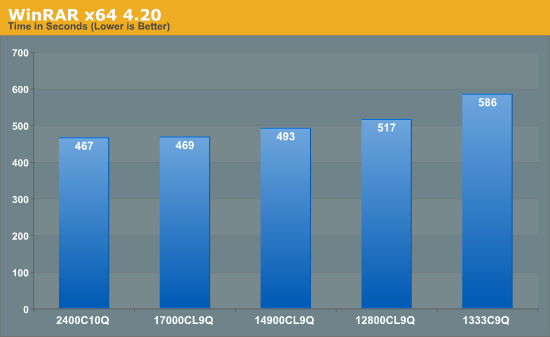
WinRAR is one of the benchmarks in our testing suite that benefits immensely from having faster memory. Moving from DDR3-1333 to DDR3-2400 speeds the process up by 20%, with the biggest gain moving from 1333 to 1600, and noticeable gains all the way up to 2133 C9.
Greysky's x264 HD 5.0.1
The x264 HD test, now version 5.0.1, tests the time to encode a 1080p video file into a high quality x264 video file. This test is standard across a range of reviews from AnandTech and other websites allowing for easy comparison. The benchmark is capable of running all cores to the maximum. Results here are reported as the average across four attempts for both the first and second passes.
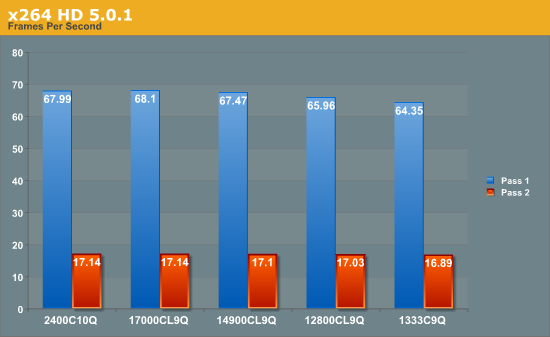
In another conversion test, we see that this benchmark gets a ~5% boost with faster memory, although Pass 1 sees a bigger boost than Pass 2. If conversion into x264 is the main purpose of the system, then the price premium of the faster memory could easily be justifiable.










114 Comments
View All Comments
Mitch101 - Thursday, October 18, 2012 - link
Love this article first time I ever commented on one. I believe you see little improvement past 1600/1866 because the Intel chips on die cache do a good job of keeping the CPU fed. Meaning the bottleneck on an Intel chip is the CPU itself not the memory or cache.Can you do this with an AMD chip also as I believe we would see a bigger improvement with their chips because the on die cache cant keep up with the chip and faster external memory would give bigger performance jumps for AMD chips. Well maybe 2 generations ago AMD but lets see your pockets are deeper than mine.
Hope I said that right I'm a little droopy eyed from lack of caffeine.
Jjoshua2 - Thursday, October 18, 2012 - link
Just bought RipjawsZ from Newegg for $90 after coupon! I feel vindicated in my choice now :)ludikraut - Thursday, October 18, 2012 - link
I thought the performance difference would be less than it was. Has me rethinking whether I need to update my old OCZ DDR3-1333 chips. I haven't yet, as I'm probably giving away 5-10% performance in my OC alone. I targeted efficiency, not absolute speed - at 4GHz my i7-920 D0 consumes 80W less @ idle than the default settings of my mobo - go figure.l8r)
Beenthere - Thursday, October 18, 2012 - link
For typical desktop use with RAM frequencies of 1333 MHz. and higher there is no tangible gains in SYSTEM performance to justify paying a premium for higher RAM frequency, increased capacity above 4 GB. or lower latencies - with APUs being the minor exception.In real apps, not synthetic benches, there is simply nothing of significance to be gained in system performance above 1333 MHz. as DDR3 running at 1333 MHz. is not a system bottleneck. Synthetic benches exaggerate any real gains so they are quite misleading and should be ignored.
tynopik - Thursday, October 18, 2012 - link
WinRAR is a 'real' appsilverblue - Thursday, October 18, 2012 - link
It's okay, he said the same thing on Xbit Labs.VoraciousGorak - Thursday, October 18, 2012 - link
"For typical desktop use with RAM frequencies of 1333 MHz. and higher there is no tangible gains in SYSTEM performance to justify paying a premium for higher RAM frequency, increased capacity above 4 GB. or lower latencies - with APUs being the minor exception."No tangible gains above four gi-... what industries have you worked in? Because my old AdWords PPC company's software benefited from over 4GB, and that's the lightest workload I've had on a computer in a while. For home use, I just bumped my system to 16GB because I kept capping my 8GB, and I do zero video/photo work. If you just do word processing, I'll trade you a nice netbook with a VGA out for whatever you're using now.
DDR3-1333 to 1600 is almost the same price on Newegg, and 1866 isn't much more. Think about it in percentage cost of your computer. Using current Newegg prices for 2x4GB CL9 DDR3, a $1000 computer with 8GB DDR3-1333 will cost $1002 with DDR3-1600, $1011 with DDR3-1866, and $1025 with DDR3-2133. Not exactly a crushing difference.
Olaf van der Spek - Thursday, October 18, 2012 - link
Why isn't XMP enabled by default? The BIOS should know what the CPU supports, shouldn't it?Gigaplex - Thursday, October 18, 2012 - link
What this article glosses over is that G.Skill memory often recommends manually increasing the voltages when enabling XMP profiles. I have the F3-1866C10D-16GAB kit and G.Skill recommends pushing the memory controller voltage out of spec for Ivy Bridge in order to enable XMP. As a result I just run them at 1333 (they don't have 1600 timings in the SPD table and I can't be bothered experimenting to find a stable setting).IanCutress - Friday, October 19, 2012 - link
I did not have to adjust the voltage once on any of these kits. If anything, what you are experiencing is more related to the motherboard manufacturer. Some manufacturers have preferred memory vendors, of which G.Skill may not be one. In that case you either have to use work arounds to make kits work, or wait for a motherboard BIOS update. If you have read any of my X79 or Z77 reviews, you will see that some boards do not like my 2400 C9 kit that I use for testing at XMP without a little voltage boost. But on the ASUS P8Z77-V Premium, all these kits worked fine at XMP, without issue.Ian